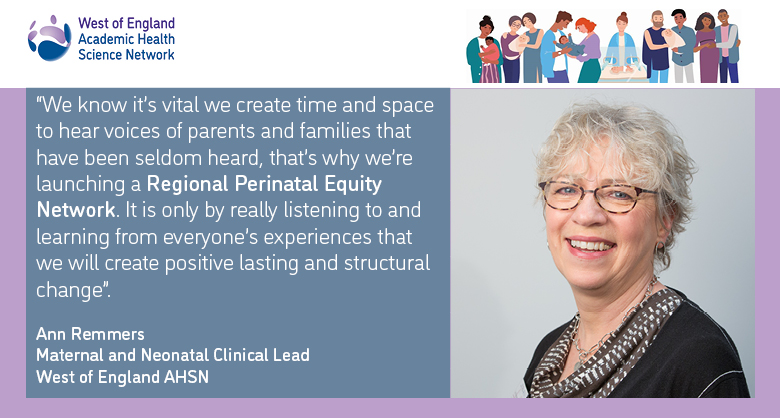
In this blog our Maternal and Neonatal Clinical Lead, Ann Remmers, reflects on inequalities in maternity care and how we’re working collaboratively to support positive change…
The Black Lives Matters movement brought into sharp focus the shocking inequalities experienced by people based on the colour of their skin. It has not only raised awareness but led some of us to examine our own prejudices, which we may previously have been unaware of. These words by George Floyd’s brother really resonated with me “educate yourself”. Our outlook on the world is based on our personal experiences, race, ethnicity, socio economic background. As a starting point we can look at ourselves, our identity and our influences and how this may impact on others.
Earlier this year I attended a two- day Cultural Competency and Safety virtual work shop run by the Sheffield Maternity Cooperative and accredited by the Royal College of Midwives. I quickly realised even before the workshop began how little I really know about racism, discrimination and bias and how much more there is to learn, just by looking at some of the excellent pre-course resources. The workshop was very interactive and I think all of us who attended were open to exploring difficult issues and challenging ourselves. One really simple thing I learnt that we can all do is check with someone how they pronounce their name, it shows you care and makes that person feel like you are treating them as an individual.
What do we know?
Sadly there are some pretty stark statistics about outcomes and experience for black and brown women and their babies. For example while stillbirth rates overall have reduced by over 16% and neonatal mortality has reduced by 11% between 2013 and 2018, “rates of death are falling more slowly among [Black and Asian] babies compared to White babies” and thus initiatives to reduce baby loss are “failing to reach many women from higher risk ethnicities”. Stillbirth rates for Black and Black British babies are over twice those for white babies and neonatal mortality rates are 45% higher. Maternal mortality is almost five times higher in women from black ethnic backgrounds and Asian and Asian British new-born babies are 60% more likely to die than white babies (MBBRACE, 2020).
Professor Marion Knight describes a constellation of biases that result in some women having poorer experiences and outcomes than others (MBBRACE, 2020) These biases include living in deprived areas, belonging to a minority ethnic group and being non-English speaking.
A national focus
It is encouraging that these inequities are now a national focus and maternity systems and organisations are being encouraged to look at their own data to address these. Two charities are exploring this further: this year, birthrights are convening a human rights inquiry to investigate and drive action on racial injustice in maternity care and Fivexmore are launching a black maternity experience survey to better understand outcomes and experience.
So how do we start to address these issues?
I think the first step has to be a personal one, we are all coming from our own personal experiences that have shaped us as we have developed and grown into adults. By examining these experiences and thinking about how they can be impacting on our interactions with others and the care we give is a massive first step. We all go to work to do a good job and want the best possible outcomes for those we care for, by educating ourselves we can achieve more for people that are disadvantaged by the way they may be viewed.
What are we doing locally?
In my organisation we are just embarking on our focus on health inequalities in maternity care and indeed all our work at the West of England AHSN. We are working with an organisation called BCohCo who are helping us to understand where inequity and inequality exists and how we can address this. It is both a personal and an organisational journey. Read more about our organisation’s work with BCohCo.
In our maternity and neonatal team we have been looking at ways to gain a greater understanding of our local population’s needs. Opening up discussions about women’s different experiences and how this impacts on their health care and outcomes and working with local groups who are raising the profile of women who experience racism. To bring people together to share approaches and experiences to tackle racism in maternity care we are setting up a Regional Perinatal Equity Network together with the South West AHSN. This first meeting will be held on 21 July.
Join us
We are all learning, and being on this journey together has to be the right thing to do to improve outcomes and experience for all mothers and babies. We know it is vital we create time and space to hear voices of parents and families that have been seldom heard, that’s why we are launching our new Network – we invite you to join us if you are interested in this area. Find out more and book your space at our first Regional Perinatal Equity Network.
It is only by working together and really listening to and learning from everyone’s experiences that we will create positive lasting and structural change which will benefit those who are at a unique and vulnerable time in their lives.

Posted on July 1, 2021 by Ann Remmers, Maternal and Neonatal Clinical Lead at the West of England AHSN


